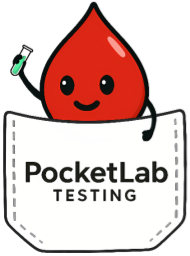How can we improve access to care without adding strain to the system that
delivers it?
This question was the beginning of everything. Having worked in healthcare across various
settings, including specialist clinics, urgent care centers, and hospitals, I have observed and
challenged systemic barriers that compromise early care, often despite the best efforts of
healthcare providers. Between long wait times, multiple appointments, and limited follow-up, the
path to care becomes a maze. People try to move forward but end up stuck without any clear
direction.
At a health innovation conference in Amsterdam, I observed how at-home diagnostic tools
were being used to bridge healthcare gaps. These tools made it easier for people to take
informed action, without depending solely on overburdened systems. The potential for applying a
similar model within Canada was immediately obvious. PocketLab started when I approached my
younger brother and his engineering friends and asked, “What if we actually tried to fix this?”
They were instrumental in building PocketLab from the ground up, especially since I only
recently discovered breadboards aren't for sandwiches, and I'm still not totally clear on what a
cookie is.
Our mission is not only to make testing more accessible, but also to improve health
literacy. When people understand what they are testing for, why it matters, and what to do next,
they are better equipped to take charge of their well-being. We design our tools with
convenience, accuracy, and reliability in mind. Everything we build is created in collaboration
with healthcare providers based on the latest clinical guidelines and evidence-based thresholds.
Although we cannot fix the system overnight, we can begin to eliminate the barriers to
healthcare access, one test kit at a time. Whether you are a patient, a provider, a caregiver,
or someone who simply believes in a better way forward, we invite you to be part of the
solution. No lab coat required!
— Rawan
CEO & Co-Founder, PocketLab Testing
How can we improve access to care without adding strain to the system
that
delivers it?
This question was the beginning of everything. Having worked in healthcare across various
settings, including specialist clinics, urgent care centers, and hospitals, I have observed and
challenged systemic barriers that compromise early care, often despite the best efforts of
healthcare providers. Between long wait times, multiple appointments, and limited follow-up, the
path to care becomes a maze. People try to move forward but end up stuck without any clear
direction.
At a health innovation conference in Amsterdam, I observed how at-home diagnostic tools
were being used to bridge healthcare gaps. These tools made it easier for people to take
informed action, without depending solely on overburdened systems. The potential for applying a
similar model within Canada was immediately obvious. PocketLab started when I approached my
younger brother and his engineering friends and asked, “What if we actually tried to fix this?”
They were instrumental in building PocketLab from the ground up, especially since I only
recently discovered breadboards aren't for sandwiches, and I'm still not totally clear on what a
cookie is.
Our mission is not only to make testing more accessible, but also to improve health
literacy. When people understand what they are testing for, why it matters, and what to do next,
they are better equipped to take charge of their well-being. We design our tools with
convenience, accuracy, and reliability in mind. Everything we build is created in collaboration
with healthcare providers based on the latest clinical guidelines and evidence-based thresholds.
Although we cannot fix the system overnight, we can begin to eliminate the barriers to
healthcare access, one test kit at a time. Whether you are a patient, a provider, a caregiver,
or someone who simply believes in a better way forward, we invite you to be part of the
solution. No lab coat required!
— Rawan
CEO & Co-Founder, PocketLab Testing


